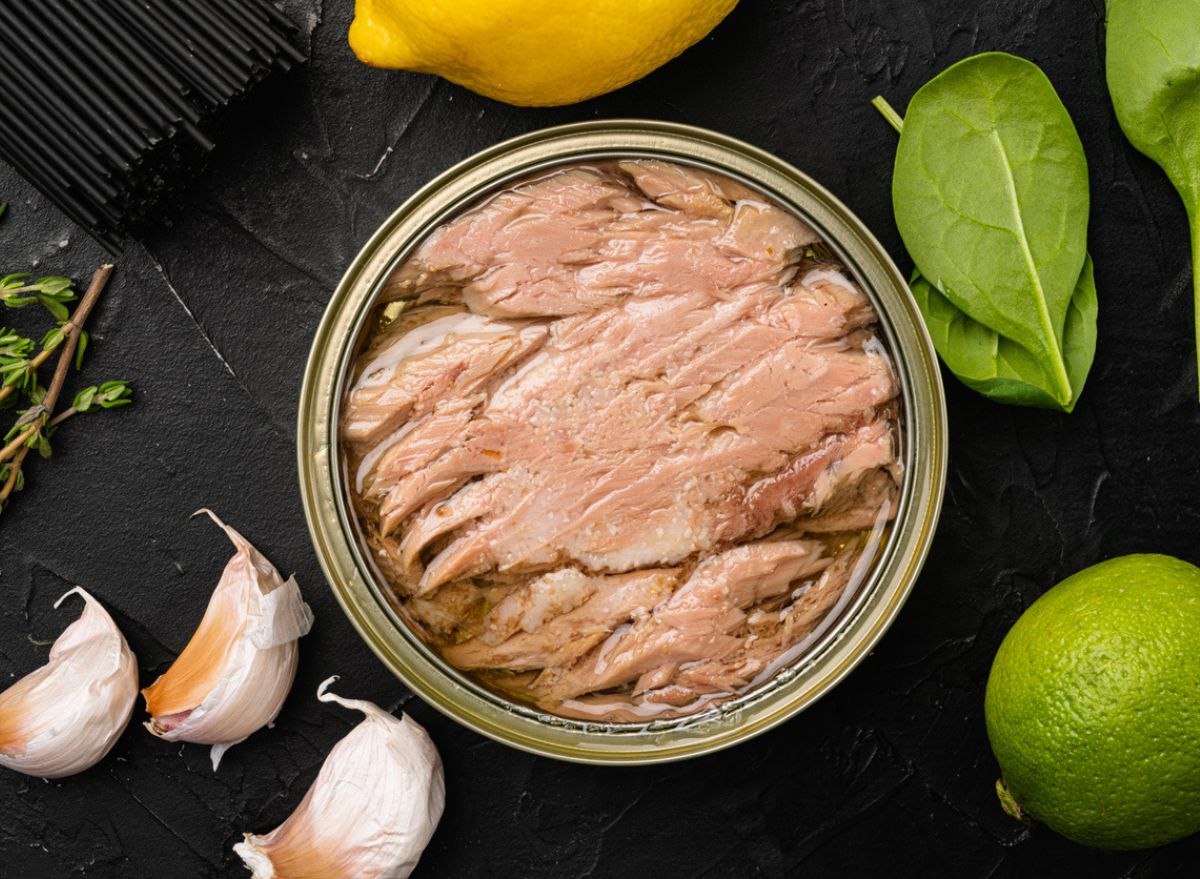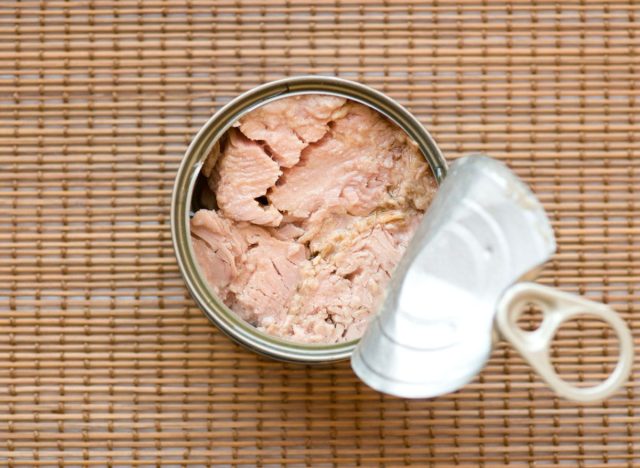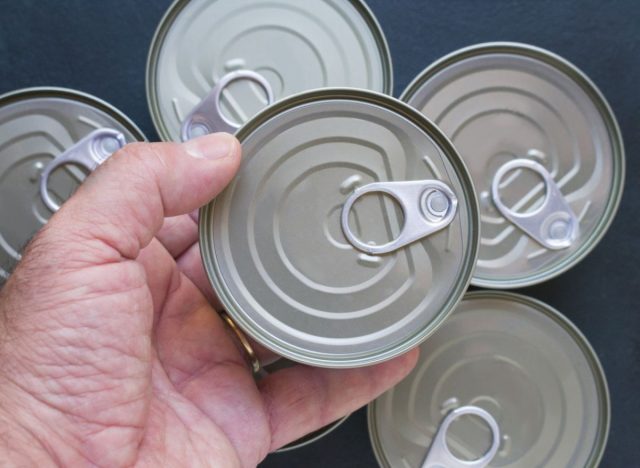Is Canned Tuna Healthy? 5 Side Effects of Eating It

In a perfect world, you'd be able to have a fresh piece of salmon straight out of the oven whenever you want, or a perfectly seared tuna filet hot and ready to go. But we all know fresh fish can be expensive and sometimes difficult to make. If you're wanting the flavors of fish, as well as its benefits related to the health of your heart and brain, but can't always afford to make it fresh, opting for something like canned tuna is a helpful choice. But is tuna from a can still healthy?
Canned tuna can offer a handful of benefits like a protein and boost and healthy fats, but it also gets a bad rap for being higher in sodium like many other canned foods, as well as potentially leading to mercury exposure. Mercury, which is found in many different types of fish and seafood, has been a growing concern because of the impact in can have on our cognitive health and mental function. And with all of these opposing thoughts about eating tuna from a can, many people may be wondering if it's worth eating at all.
To learn more about whether canned tuna is healthy, or if you're better leaving it on the grocery store shelf, read on to learn its benefits and possible side effects. Then, for more healthy eating tips, check out Every Popular Fish—Ranked by Nutrition!
Benefits of canned tuna

You'll get a boost of protein
When you think of protein, your mind may go straight to eggs, chicken, beef, and so on—but don't forget about fish! One of the main benefits of eating canned tuna is that it is an affordable, easy way to get a protein boost. In fact, a whole can has about 40 grams of protein, with a 3-ounce serving containing around 20 grams.
Tuna is also considered to be a complete protein, which means it carries all nine essential amino acids, and not all sources of protein do. For instance, while fish, eggs, poultry, beef, tofu, and tempeh are complete proteins, things like nuts, vegetables, and legumes are incomplete. This doesn't mean that incomplete proteins aren't important, it's just necessary to get a combination of both. Not only does tuna contain a lot of protein, it's actually made up almost entirely of this nutrient. This fish is extremely low in fat and carbohydrates, and is made up of around 90% protein.
You can support brain and eye health
Like many other types of fish and seafood, canned tuna is high in omega-3 fatty acids, and this healthy type of fat has a lengthy list of potential benefits. For one, studies have shown that dietary consumption of omega-3s can help with depression symptoms and overall mood, as well as helping to slow age-related cognitive decline. Recent research reports have also concluded that omega-3s can help with cardiovascular health by way of lowering cholesterol, helping to reduce blood clots, and lower inflammation.
Because of these healthy omega-3 fatty acids found in fish like tuna, the American Heart Association recommends two servings of fish per week. When you need to meet this suggestion in a quick and easy way, canned tuna is the perfect choice.
Potential side effects

You might eat too much sodium
A potential side effect of eating canned tuna is that many brands are heavy on the sodium. For example, a 3-ounce serving of Bumble Bee White Albacore Tuna has 210 milligrams of sodium, and Chicken of the Sea has 360 milligrams. Eating high amounts of sodium from time to time shouldn't have much of an effect on your health, but consistently eating too much sodium can lead to high blood pressure and cardiovascular issues.
This amount of sodium may not seem like a lot at first. But with the recommended daily allowance being no more than 2,300 milligrams of sodium, a canned tuna-centric snack can easily cause you to go above your daily limit. For a lower sodium canned tuna option, try something like Genova Premium Albacore Tuna.
You can also consume a lot of fat in one sitting
Canned tuna either comes in water or oil, and while the varieties in oil come with a bigger flavor and a more moist texture, it can often pack in a bit too much fat for one snack. Take Target brand Premium White Albacore Tuna, for example. Although it's sitting in 10 grams of olive oil, which is a heart-healthy oil known to help lower risk of cardiovascular disease, it can also contribute to too much total fat in one sitting.
According to the Dietary Guidelines for Americans, it is recommended to make sure 20-35% of your daily diet is fat, which is between 44 and 78 grams of fat per day on a 2,000 calorie diet. As you can see, 10 grams in a can of tuna is a large chunk of your daily recommended value.
And mercury poisoning is a possible risk
A common question that people have when it comes to canned tuna is whether or not they will risk getting mercury poisoning, which research shows can lead to cognitive impairment and memory loss. The short answer is yes, there's a risk of mercury exposure when you choose to eat canned tuna, but different varieties of tuna contain different levels of mercury.
According to Consumer Reports, the five most popular tuna brands (Wild Planet, Bumble Bee, StarKist, Chicken of the Sea, and Safe Catch) all contained certain levels of mercury. However, albacore across all oft he brands contained more mercury than skipjack or light varieties on average. CR also found concerning and unexpected spikes of mercury that occurred throughout six of the 30 cans, and there weren't any predictable patterns with these spikes. This may leave you wondering if eating canned tuna is safe, but the FDA says adults should be fine eating one or two servings a week, as long as those who are pregnant or breastfeeding avoid tuna and other fish that may contain mercury.
Also, according to the journal Environmental Research tuna contains selenium, which is a nutrient that actually have protective qualities against the mercury found in tuna and other fish.
So, is canned tuna good for you?

There's a lot to consider before making yourself a tuna salad sandwich. Canned tuna is high in helpful nutrients like protein and omega-3 fatty acids, and it can make for a deliciously satiating snack to keep you full in between meals. Or, it can be enjoyed as a part of a main meal in order to help you reach your daily protein goals. Even though some varieties are higher in sodium or fat, you can look for brands that have lower levels of both.
So as long as you find the brand you trust that is lower in sodium and fat, eating canned tuna a couple of times a week can be perfectly safe and a healthy part of your daily diet.
- Source: https://www.ncbi.nlm.nih.gov/pmc/articles/PMC7468748/
- Source: https://www.ncbi.nlm.nih.gov/pmc/articles/PMC7103640/
- Source: https://www.epa.gov/mercury/health-effects-exposures-mercury
- Source: https://fdc.nal.usda.gov/fdc-app.html#/food-details/175158/nutrients
- Source: https://health.clevelandclinic.org/do-i-need-to-worry-about-eating-complete-proteins/
- Source: https://www.ncbi.nlm.nih.gov/pmc/articles/PMC8313386/
- Source: https://www.ncbi.nlm.nih.gov/pmc/articles/PMC8854294/
- Source: https://www.ncbi.nlm.nih.gov/pmc/articles/PMC7827286/
- Source: https://www.heart.org/en/healthy-living/healthy-eating/eat-smart/fats/fish-and-omega-3-fatty-acids
- Source: https://www.hsph.harvard.edu/nutritionsource/salt-and-sodium/
- Source: https://www.consumerreports.org/health/food-safety/how-worried-should-you-be-about-mercury-in-your-tuna-a5041903086/
- Source: https://www.fda.gov/food/consumers/advice-about-eating-fish
- Source: https://www.sciencedirect.com/science/article/abs/pii/S0013935115001425?via%3Dihub









